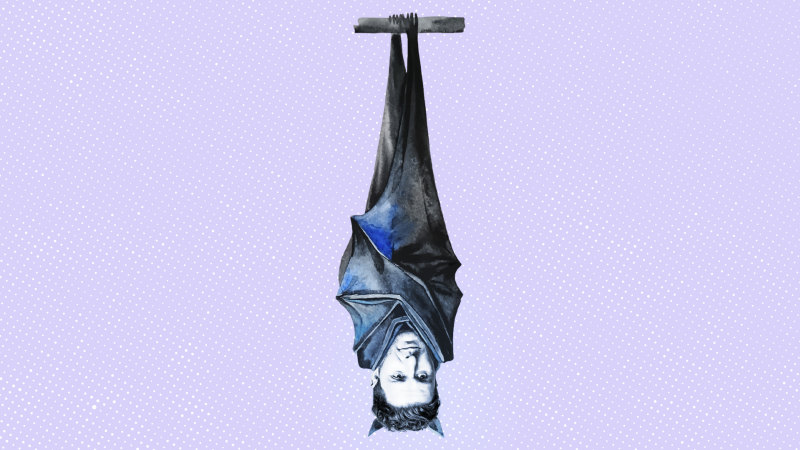White noise, green lights and a silk mask: Sleeping is more exhausting than ever
Save articles for later
Add articles to your saved list and come back to them any time.
Every morning I wake up to a notification from the Health app on my iPhone that reads: Thomas, how did you sleep?
It feels a bit rich for the iPhone to push me on this, given it knows better than anyone that I slept poorly. Despite being the one to set my Sleep Schedule (bed at 9pm, asleep by 9.30pm), the phone was there at 9.45pm when I spent an hour doing a deep dive on why we’re experiencing more sinkholes than ever (spoiler alert: climate change).
It was also present at 11pm as I searched Facebook to see which of my high school teachers were alive (spoiler alert: most of them).
Once upon a time, sleep came easily, now switching off for the night requires a large-scale light and sound show. Credit: Marija Ercegovac
Like most boring people, my wife and I typically begin the day by inquiring how the other person slept. It’s the kind of question where you never expect the answer to be good, just varying degrees of bad.
“Not bad” is pretty good, “pretty bad” is considered normal and “Oh my god, I’m so exhausted, I feel like I barely slept” means exactly that.
Sleep has become an increasingly important topic in our lives since the arrival of our son four months ago. Having a child is an excuse for people to talk to you about sleep incessantly, which I obviously welcome, being someone obsessed with dull sleep chat.
But even before he came along, I accepted that I have become one of those people fixated on all things sleep. Sleep health, sleep hygiene, sleep habits and sleep cycles.
If there’s an article that promises a better night’s sleep, chances are I’ve read it – probably when I should have been asleep.
Everywhere you look, people are dissecting sleep. We’re frantically downloading the Calm app in an effort to soothe ourselves; we’re flicking through Michael Mosley’s Fast Asleep guidebook and scouring the internet for handy sleep hacks.
The science of sleep is filling our waking hours, which makes sense, considering Australians are so bad at it. The average Australian has 6.9 hours of sleep each night (seems generous), below the recommended period of between seven and nine hours.
Me in bed reading about all the reasons I can’t sleep. Credit: Stock
Meanwhile, according to ResMed’s most recent global sleep survey, 42 per cent of Australians usually wake up feeling tired – the second-highest level among a dozen countries. The study also found Australians mostly lose sleep over the cost of living crisis, with one in three blaming financial pressure for their declining quality of rest.
Being too stressed to sleep and then stressing about not getting enough sleep is precisely the kind of vicious cycle that would keep you up at night.
However, for me, the struggle is easier to distill: I am now old and sensitive.
Ten years ago, I could fall asleep anywhere, any time, under any circumstances: clubs, pubs, cabs, buses, one bleak moment at an Oporto during the day. Back then, I just needed to be a little bit tired and a little bit horizontal.
Me at 23 having a nap between naps.
But at 33, falling asleep no longer seems an appropriate phrase. Falling asleep implies a gentle tumble in a theatre of dreams. Instead, I am battling my way to sleep, a full-blown logistical operation to trick my body into shutting down.
My nightly bedroom routine is like a DIY Vivid Festival. First, I switch on the Star Projector, essentially the adult version of a night light, which offers a selection of coloured stars that I beam onto the ceiling. I select green, aware that green light can react with melanopsin – a natural sleep hormone that is good for relaxation. Great!
Next comes my white noise track of choice – Relaxing Heartbeat White Noise for Sleep (8 Hours) – which fools me into thinking I am back in the womb. At the same time, my son’s bassinet also plays its own white noise sounds, creating a duelling banjo effect that sounds stressful but is actually calming in a chaotic way.
The final puzzle piece is a silk sleep mask, which I pop on because I can’t be trusted to keep my eyes closed otherwise. Together, these elements act like a well-oiled machine, and the net result is usually 6.5 hours of sleep (still less than the average).
My fear is that as I get older, even more infrastructure will be required to achieve the same result. At 43, will I be lying under a weighted blanket while a scented oil diffuser spritzes softly in the background? Perhaps.
Or maybe I will become one of those old people that potters around at night, staring into the mirror and asking myself: “Thomas, did you even sleep?”
Find more of the author’s work here. Email him at [email protected] or follow him on Instagram at @thomasalexandermitchell and on Twitter @_thmitchell.
The Booklist is a weekly newsletter for book lovers from books editor Jason Steger. Get it delivered every Friday.
Most Viewed in National
From our partners
Source: Read Full Article




